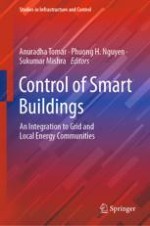2022 | OriginalPaper | Buchkapitel
7. Energy Solutions for Smart Buildings Integrated with Local Energy Communities
verfasst von : Shalika Walker, Pedro P. Vergara, Wim Zeiler
Erschienen in: Control of Smart Buildings
Verlag: Springer Nature Singapore
Aktivieren Sie unsere intelligente Suche, um passende Fachinhalte oder Patente zu finden.
Wählen Sie Textabschnitte aus um mit Künstlicher Intelligenz passenden Patente zu finden. powered by
Markieren Sie Textabschnitte, um KI-gestützt weitere passende Inhalte zu finden. powered by
